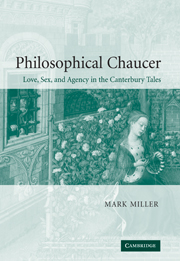Book contents
- Frontmatter
- Contents
- Acknowledgments
- Introduction: Chaucer and the problem of normativity
- Chapter 1 Naturalism and its discontents in the Miller's Tale
- Chapter 2 Normative longing in the Knight's Tale
- Chapter 3 Agency and dialectic in the Consolation of Philosophy
- Chapter 4 Sadomasochism and utopia in the Roman de la Rose
- Chapter 5 Suffering love in the Wife of Bath's Prologue and Tale
- Chapter 6 Love's promise: the Clerk's Tale and the scandal of the unconditional
- Notes
- Bibliography
- Index
Chapter 2 - Normative longing in the Knight's Tale
Published online by Cambridge University Press: 22 September 2009
- Frontmatter
- Contents
- Acknowledgments
- Introduction: Chaucer and the problem of normativity
- Chapter 1 Naturalism and its discontents in the Miller's Tale
- Chapter 2 Normative longing in the Knight's Tale
- Chapter 3 Agency and dialectic in the Consolation of Philosophy
- Chapter 4 Sadomasochism and utopia in the Roman de la Rose
- Chapter 5 Suffering love in the Wife of Bath's Prologue and Tale
- Chapter 6 Love's promise: the Clerk's Tale and the scandal of the unconditional
- Notes
- Bibliography
- Index
Summary
In chapter one I characterized the Miller's naturalism as a species of normative nostalgia, a longing for grounds of action and identity which seem perpetually to reside in some fantasized past – in this case the “past” of an “animality” foregone by the Miller's very need to lay claim to it. Normative nostalgia, of course, is hardly local to the Miller's Tale. The myths of the Golden Age and the Fall depend on it, and it is a long-standing interest of Chaucer's: as he puts it in his lyric poetry, the “Former Age” of wholeheartedness, simplicity, and peace has been replaced by duplicity, tyranny, undisciplined appetite, and a general “Lak of Stedfastnesse.” Chaucer begins the Canterbury Tales with a tale in which this interest is wide-ranging and explicit. As the long speech with which Theseus concludes the Knight's Tale suggests, for the Knight all of life is in some sense a “fall” into materiality and individuation, a loss of the pure, unified, unimpeded activity of the Prime Mover; and this metaphysical nostalgia mirrors a social and ethical nostalgia for a lost chivalric ideal which the Knight projects on to the tale's classical setting. In this chapter and the two to follow I will continue exploring Chaucer's interest in normative nostalgia. In doing so I will move beyond the trope of nostalgia to try to understand the broader structures of normative longing that inform it.
- Type
- Chapter
- Information
- Philosophical ChaucerLove, Sex, and Agency in the Canterbury Tales, pp. 82 - 110Publisher: Cambridge University PressPrint publication year: 2005

